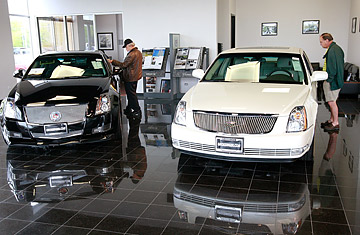
Customers look over Cadillacs offered for sale at a GM dealership.
Chrysler and GM (GM) propose closing 3,000 dealers in an effort to save money by narrowing down their distribution networks. Some of the larger dealers probably employ 100 people. In an economy that is losing nearly 600,000 jobs a month, the new efficiency program from Detroit is going to add to the burden of unemployed Americans very quickly.
In the early years of the automobile, car dealers took animals in trade. As time passed the largest dealerships built elaborate showrooms and spent their own money for events around new model debuts. Running a large dealership is expensive. Buying cars from the manufacturers has not been a winning proposition for many dealers over the last two years. Most have to borrow money to purchase inventory. As sales have dropped due to the recession, many vehicles stay on the lots for months. Being a car dealer went from being extremely profitable in many cases to being a no-win business. (See pictures of Detroit's decline.)
The relationship between The Big Three and its dealers was, for many years, symbiotic. There was some real balance between the products and marketing that came from the manufacturing and the sales and service that came from the dealer. That bond has been broken in an especially short period since approximately a third of the distributors of cars for Chrysler and GM will lose their franchises. It is the only financially expedient thing to do, but the government is, once again, encouraging an action that will put tens of thousands of taxpayers out of jobs. By placing the large car companies on short leases, the Administration is insisting that they destroy decades-old relationships with suppliers, shareholders, debtholders, and dealerships. It is not entirely clear that the destruction won't be more expensive than the bailout.
Depending on how an accountant would value the equity that the Treasury will get in Detroit, the federal government will put $40 billion into the U.S. car industry and that number could go higher if the domestic automotive market does not recover. The auto industry is selling fewer than 10 million cars a year after selling over 16 million just four year ago and under those circumstances no expense reduction will make the industry profitable.
Shuttering car parts suppliers, large and small, closing dealers, firing tens of thousands of white collar and blue collar workers costs the American economy, in aggregate, more money than is imaginable and very possibly more than $40 billion over the next two or three years.
The government operates by blunt force. It does not have the agility to do surgical work. That not only leads to mistakes that might not be made if the government had a great deal of time and a great many experts to solve problems. During an economic collapse those assets are too precious. (See pictures of the global financial crisis.)
Pathos is one word that could describe the shuttering of 3,000 American car dealers. Car sales operations have not always had a great reputation with the public but the human costs of shuttering them is no different than closing a hospital or a munitions factory.
— Douglas A. McIntyre
See pictures of Detroit's decline.
For constant business updates, go to 24/7wallst.com.
